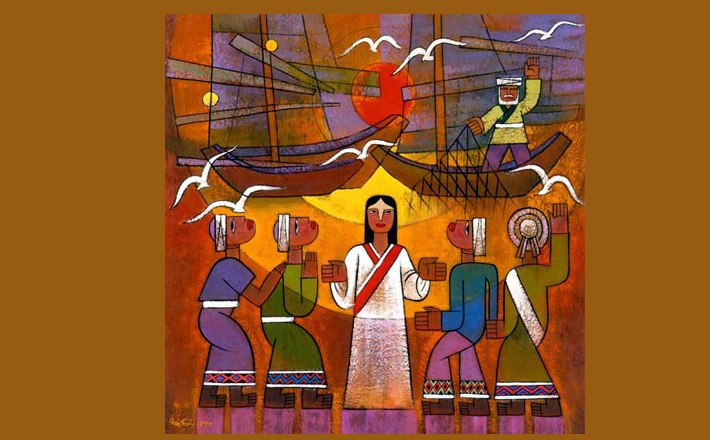Commentary on Psalm 27:1, 4-9
One of the brightest jewels in the Psalter is Psalm 27.
It’s situated on the third Sunday of Epiphany but could be read and pondered with great profit and joy any Sunday, or at any moment.
How profound is the first verse? “The Lord is my light.” In ancient times there were two kinds of light: the sun and the lamp. First, the sun: brilliant, unable to be stared at, and, like God, the sun gives light, warmth, and life, and highlights beauty. No wonder pagans worshipped the sun. God’s first concoction, and God’s most primal gift to us, is light. On Day 1 of all history, “God said, ‘Let there be light’” (Genesis 1:3). John echoes, “God is light, and in him is no darkness at all” (1 John 1:5).
We’re not much afraid of the light, but we do fear the dark—and many other things. The antidote to fear—in our culture—is security, locks, guns. But in God’s kingdom, the fix for fear is this Lord who is our light.
When it got dark in biblical times, they lit lamps—not the brilliant LED lanterns you can purchase today, but simple pottery lamps, with a single wick and flame, casting just enough light to see a short way ahead. Psalm 119:105 says, “Your word is a lamp to my feet and a light to my path.” If we follow God’s will, we do not know what the road will look like in a few miles or years. God gives us just a pottery lamp’s worth of light, just enough to take a few more steps. We have to trust God with that kind of light.
“The Lord is my light … ; whom shall I fear?” We fear the future—but with God as our light, that small flicker banishes the darkness and we are not alone.
“One thing I asked of the Lord; that will I seek after: to live in the house of the Lord all the days of my life, to behold the beauty of the Lord, and to inquire in his temple,” says verse 4. This is one of the Bible’s most eloquent, emotionally powerful, visionary verses, well worth memorizing, or installing as your life’s mission statement, etching it into the core of your soul.
We ask a great many things of God, of ourselves, of others, and of life. But really, there is just “one thing” that finally matters, and to garner everything else but miss out on the one good thing would be tragic. To the rich young man, who was not only successful but also diligently religious, Jesus said, “One thing you lack” (Luke 18:22). Martha busied herself preparing a multi-course feast for Jesus, but he said, “One thing is needful” (Luke 10:42)—and he didn’t mean just one dish. Jesus spoke of a merchant who sold everything just to purchase the one fantastic pearl (Matthew 13:45).
The world tells us to cram, to wrap our arms around as many neat things as possible. But like hauling a load of laundry, you drop some socks and a shirt or two. And then it’s just a bunch of laundry anyway. In trying to grab it all, we actually miss it all. What if you could focus and be satisfied with just one thing?
There is only one thing that is enough. The psalmist speaks of it as “dwelling in the house of the Lord all my days”—that is, to be near God, even to be someone who worships God, not just in worship but constantly, all day, every day. I’m not in the Lord’s house just now, but can the mood linger? Can the recollection, the experience, resonate in what seems like an unholy place? Can any old house actually become for me the house of the Lord?
The psalmist adds another intriguing nuance: the one thing? “To behold the beauty of the Lord.” Not merely to see the Lord, which would be incredible and stupendously wonderful. But it is “the beauty of the Lord.” When we see beauty, it’s hard to look away. We must have it. We do not notice competitors for our attention.
And the beauty changes us. Jewel sang, “Maybe if we are surrounded in beauty, someday we will become what we see.”1 You are beautiful—or you can be, but the way to beauty isn’t cosmetics or plastic surgery or the right clothes or jewelry. It is only as we are surrounded by the beauty of God, the wonders of creation, the Scriptures, the holy saints, church buildings, goodness, and prayerfulness: This is the way to beauty, which is the way to God.
So many pregnant phrases in Psalm 27 beg for reflection.
- “Now my head is lifted up” (verse 6)—that we do not hang our heads any longer, but look forward, with dignity, because of God’s salvation.
- “Your face, Lord, do I seek” (verse 8)—for we do not seek some vague, ephemeral deity, but a God with a human face, the compassionate, strong face of Jesus, God become like us.
- “I believe I shall see the goodness of the Lord in the land of the living” (verse 13)—that faith is not merely about the pledge of eternal life in another world, but it is in this world, not merely some spiritual realm, but the real, physical world, in my body, in my neighborhood, in politics, in economics, everywhere that is anywhere now.
Maybe for the working preacher, a wise course might be to surrender on the work and yield yourself to the psalm, or maybe even in worship just to let the psalm stand on its own and let the people listen and marvel while you let it do its own lovely work.
Notes
- Jewel, “I’m Sensitive,” Pieces of You, Atlantic Recordings, 1995.


January 26, 2014